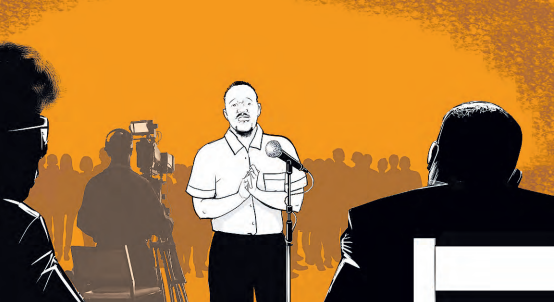

In her book, The Challenge for Africa, 2004, the
Nobel Peace Prize laureate and environmentalist
Professor Wangari Maathai used the traditional
African three-legged stool as a metaphor for what
she views as the three components of a stable
society: sustainable environmental management,
democratic governance and a culture of peace.
Drawing from Prof Maathai’s analogy, this paper focuses on the second leg – democratic governance – through the lens of county governments.
Importantly, this paper posits that public participation is not only a right but also a core value and principle essential to promoting good governance at county level. Article 1 of the Constitution states that sovereign power vests with the people.
This power is meant to be expressed either directly through public participation by the citizens or indirectly through their elected representatives.
Further, Article 6 of the Constitution creates a decentralised system of government, with the primary goal of devolving power, resources and representation to the local level.
It is noteworthy that the constitution identifies county governments as the appropriate level to entrench and ensure public participation in governance.
Indeed, one of the functions allocated to the county governments is stipulated under Section 14 , Part 2 of the Fourth Schedule: ensuring and coordinating the participation of communities and locations in governance at the local level and assisting communities and locations in developing administrative capacity for the effective exercise of the functions and powers and participation in governance at the local level.
The County Government Act (Cap 265), Public Finance Management Act (Cap 412A), and the Urban Areas and Cities Act (Cap 275) emphasise participation in a number of governance areas, including public finance management, planning, performance management, development of policies and legislations, implementation of the Bill of Rights and service delivery.
Public participation improves accountability, it enables the public to own both the process and the product. Public participation plays a critical role in promoting democratic governance.
Notably, public participation ensures inclusivity and transparency in governance making county governments more responsive to the citizens’ needs thus increasing the legitimacy of government’s decisions and institutions.
Although counties have made significant strides in enhancing meaningful public participation, including but not limited to development and enactment of laws on public participation, there remains no overarching legislation to clarify what constitutes adequate participation, the nature of the participation that meets the constitutional threshold, or the most effective mechanisms for public participation.
In the absence of a substantive law on public participation, attention has been shifted towards the courts for interpretation of the concept.
The most exhaustive discussion on public participation was done in the case of Joseph Enock Aura vs Cabinet Secretary, Ministry of Health & 13 Others, Constitutional Petition Number E473 of 2023 in the High Court of Kenya at Nairobi.
In pronouncing itself on the importance of public participation, the court outlined what it called the “bare minimum” requirements from public participation.
Most of these are familiar ones – adequate notice, actively facilitating participation, inclusivity, diversity, and transparency.
Significantly, the court held that before a technical exercise of public participation commences, there is an affirmative obligation to conduct public sensitisation.
This judgment marks a significant contribution towards global debates on the place of public participation in a populace committed to representative democracy.
This judgment not only stresses that public participation is a right but also imposes an obligation for public sensitization as a precursor to public participation.
The creation of a decentralised system of government by the Constitution meant that citizens would be empowered through provision of information, and be allowed to participate in the decision-making process on matters that affect their livelihoods.
The spirit of the
Constitution calls not only for public participation
to take place, but for it to be meaningful so it can
impact the process.












